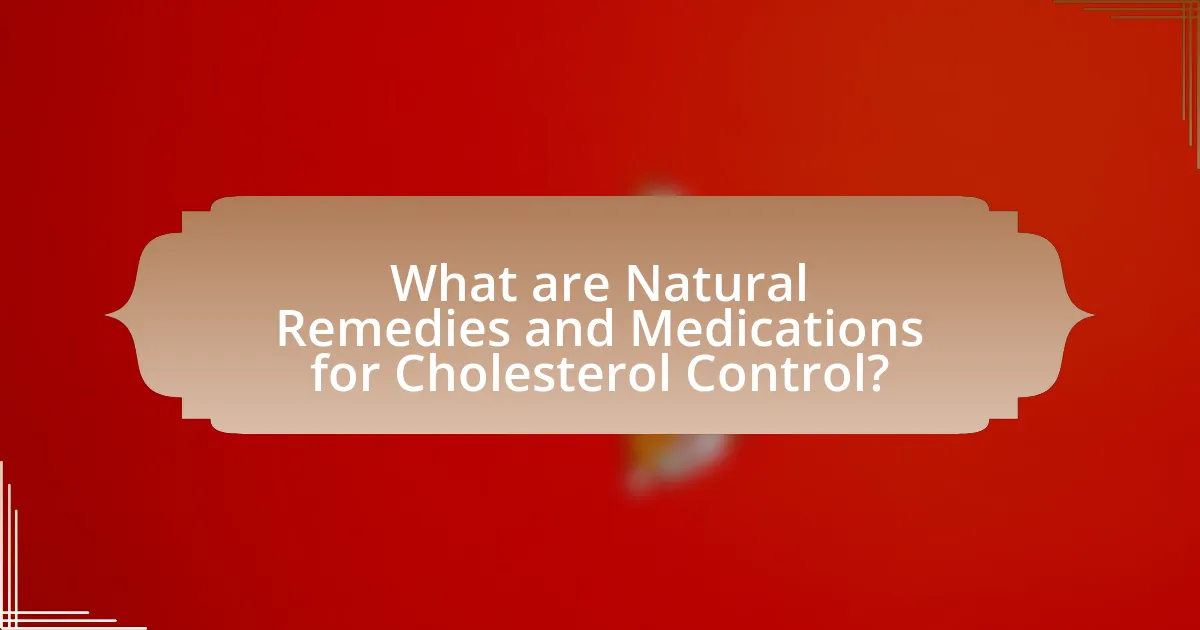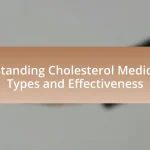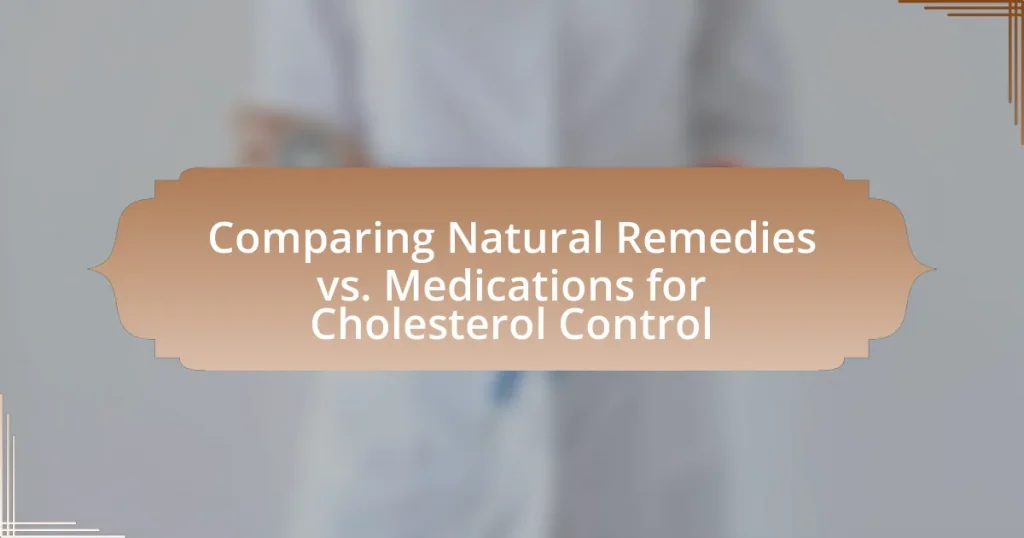The article focuses on comparing natural remedies and medications for cholesterol control, highlighting their differences, effectiveness, and safety. It outlines common natural remedies, such as dietary changes and herbal supplements, which aim to lower cholesterol levels through lifestyle modifications. In contrast, it discusses various medications, primarily statins, that provide a pharmacological approach to managing cholesterol. The article also emphasizes the importance of cholesterol control for overall health, the risks associated with high cholesterol levels, and the role of lifestyle changes in enhancing treatment outcomes. Additionally, it addresses the potential side effects of medications compared to natural remedies and offers guidance on integrating both approaches for optimal cholesterol management.

What are Natural Remedies and Medications for Cholesterol Control?
Natural remedies for cholesterol control include dietary changes, such as increasing soluble fiber intake from oats, beans, and fruits, and incorporating healthy fats from sources like olive oil and avocados. Medications for cholesterol control typically involve statins, which lower LDL cholesterol levels effectively; for example, atorvastatin has been shown to reduce the risk of cardiovascular events by approximately 30% in high-risk patients. Both approaches aim to manage cholesterol levels, but natural remedies focus on lifestyle modifications while medications provide a pharmacological solution.
How do Natural Remedies differ from Medications in Cholesterol Management?
Natural remedies differ from medications in cholesterol management primarily in their composition and mechanism of action. Natural remedies often include dietary changes, herbal supplements, and lifestyle modifications that aim to lower cholesterol levels through holistic approaches, such as increasing fiber intake or using plant sterols. In contrast, medications like statins or fibrates are specifically formulated pharmaceuticals that target cholesterol production in the liver or enhance its clearance from the bloodstream.
Research indicates that while natural remedies can be effective, they generally produce more gradual changes in cholesterol levels compared to the rapid effects of medications. For instance, a study published in the Journal of the American College of Cardiology found that statins can reduce LDL cholesterol by 30-50% within weeks, while natural remedies may take months to show similar results. Thus, the key difference lies in the speed and mechanism of action, with medications providing more immediate and targeted effects.
What are the common Natural Remedies used for Cholesterol Control?
Common natural remedies for cholesterol control include dietary changes, such as increasing soluble fiber intake, consuming omega-3 fatty acids, and incorporating plant sterols and stanols. Soluble fiber, found in foods like oats and beans, helps reduce LDL cholesterol levels by binding to cholesterol in the digestive system. Omega-3 fatty acids, present in fatty fish like salmon and flaxseeds, can lower triglycerides and improve overall heart health. Plant sterols and stanols, found in fortified foods, can block cholesterol absorption in the intestines. Studies have shown that these natural remedies can effectively lower cholesterol levels, making them a viable option for managing cholesterol alongside medications.
What types of Medications are prescribed for Cholesterol Management?
Medications prescribed for cholesterol management primarily include statins, bile acid sequestrants, niacin, fibrates, and PCSK9 inhibitors. Statins, such as atorvastatin and simvastatin, are the most commonly prescribed and work by inhibiting cholesterol production in the liver, effectively lowering LDL cholesterol levels. Bile acid sequestrants, like cholestyramine, bind bile acids in the intestine, leading to reduced cholesterol absorption. Niacin, also known as vitamin B3, can improve cholesterol levels by increasing HDL cholesterol and lowering triglycerides. Fibrates, such as fenofibrate, primarily lower triglyceride levels and can modestly increase HDL cholesterol. PCSK9 inhibitors, like alirocumab and evolocumab, are newer agents that significantly lower LDL cholesterol by enhancing the liver’s ability to remove it from the bloodstream. These medications are supported by clinical guidelines and studies demonstrating their efficacy in reducing cardiovascular risk associated with high cholesterol levels.
Why is Cholesterol Control Important for Health?
Cholesterol control is important for health because it reduces the risk of cardiovascular diseases, including heart attacks and strokes. High levels of low-density lipoprotein (LDL) cholesterol can lead to plaque buildup in arteries, which narrows them and restricts blood flow. According to the American Heart Association, managing cholesterol levels can lower the risk of heart disease by up to 30% when combined with a healthy lifestyle. Therefore, maintaining optimal cholesterol levels is crucial for overall cardiovascular health and longevity.
What are the risks associated with high cholesterol levels?
High cholesterol levels significantly increase the risk of cardiovascular diseases, including heart attacks and strokes. Elevated low-density lipoprotein (LDL) cholesterol can lead to the buildup of plaques in arteries, a condition known as atherosclerosis, which narrows blood vessels and restricts blood flow. According to the American Heart Association, individuals with high LDL cholesterol are twice as likely to develop heart disease compared to those with optimal levels. Additionally, high cholesterol can contribute to hypertension and peripheral artery disease, further compounding cardiovascular risks.
How does cholesterol impact overall health?
Cholesterol significantly impacts overall health by influencing the risk of cardiovascular diseases. High levels of low-density lipoprotein (LDL) cholesterol can lead to the buildup of plaques in arteries, increasing the likelihood of heart attacks and strokes. According to the American Heart Association, elevated LDL cholesterol is a major risk factor for coronary artery disease, which affects millions globally. Conversely, high-density lipoprotein (HDL) cholesterol is considered protective, as it helps remove LDL cholesterol from the bloodstream. Maintaining a balanced cholesterol level is crucial for cardiovascular health and overall well-being.
What factors should be considered when choosing between Natural Remedies and Medications?
When choosing between natural remedies and medications for cholesterol control, factors such as efficacy, safety, individual health conditions, potential side effects, and cost should be considered. Efficacy refers to how well each option lowers cholesterol levels; for instance, statins are clinically proven to reduce LDL cholesterol significantly. Safety involves assessing any adverse effects; medications may have side effects like muscle pain, while natural remedies may interact with other supplements. Individual health conditions, such as existing medical issues or allergies, can influence the choice, as some remedies may not be suitable for everyone. Potential side effects should be evaluated, as medications often come with a list of risks, while natural remedies may have fewer documented side effects. Lastly, cost can be a deciding factor, as some medications may be expensive or require insurance, whereas many natural remedies can be more affordable.
How do effectiveness and safety compare between Natural Remedies and Medications?
Natural remedies and medications differ significantly in effectiveness and safety for cholesterol control. Medications, such as statins, have been clinically proven to lower LDL cholesterol levels and reduce cardiovascular events, with studies indicating a 30-40% reduction in heart attack risk. In contrast, natural remedies, like dietary changes and supplements such as omega-3 fatty acids, may offer modest benefits, often resulting in a 5-15% reduction in cholesterol levels, but lack the robust clinical evidence that supports medications.
Regarding safety, medications can have side effects, including muscle pain and liver damage, which are well-documented in clinical trials. Natural remedies generally have fewer side effects, but their efficacy can vary widely among individuals, and some may interact with other medications. Therefore, while medications provide more consistent and significant cholesterol-lowering effects, natural remedies may be safer but less effective, highlighting the need for personalized approaches in cholesterol management.
What role do lifestyle changes play in cholesterol management?
Lifestyle changes play a crucial role in cholesterol management by significantly lowering LDL (bad cholesterol) levels and raising HDL (good cholesterol) levels. Research indicates that dietary modifications, such as increasing fiber intake and reducing saturated fats, can lead to a decrease in total cholesterol by 5% to 10% within a few weeks. Regular physical activity, such as aerobic exercise, can also improve cholesterol levels, with studies showing that engaging in moderate exercise for 150 minutes per week can raise HDL cholesterol by 5% to 10%. Additionally, weight loss can further enhance cholesterol profiles; losing just 5% to 10% of body weight can lead to a notable reduction in LDL cholesterol. These lifestyle changes are often recommended as first-line interventions before considering medications for cholesterol control.
How can one transition from Natural Remedies to Medications or vice versa?
To transition from natural remedies to medications or vice versa, one should consult a healthcare professional to evaluate the effectiveness and safety of both approaches. This consultation is crucial because it ensures that any changes in treatment do not lead to adverse interactions or side effects. For instance, certain natural remedies may affect the metabolism of medications, necessitating dosage adjustments. Additionally, clinical studies, such as those published in the Journal of the American College of Cardiology, indicate that combining lifestyle changes with medications can optimize cholesterol control. Therefore, a structured plan developed with a healthcare provider can facilitate a safe and effective transition between natural remedies and medications.
What are the potential side effects of Medications compared to Natural Remedies?
Medications typically have a range of potential side effects, including gastrointestinal issues, liver damage, and increased risk of diabetes, while natural remedies generally have fewer and less severe side effects, such as mild digestive discomfort or allergic reactions. For instance, statins, a common class of cholesterol-lowering medications, can cause muscle pain and liver enzyme abnormalities in some patients, as noted in a study published in the Journal of the American College of Cardiology. In contrast, natural remedies like omega-3 fatty acids or plant sterols are often well-tolerated, with side effects primarily limited to mild gastrointestinal upset, as reported by the American Heart Association. This comparison highlights that while both approaches can be effective for cholesterol control, medications may carry a higher risk of significant adverse effects.

What are the Benefits and Drawbacks of Natural Remedies for Cholesterol Control?
Natural remedies for cholesterol control offer benefits such as potential reduction in LDL cholesterol levels and improvement in overall heart health, often attributed to ingredients like omega-3 fatty acids, soluble fiber, and plant sterols. For instance, studies have shown that consuming foods rich in soluble fiber, like oats and beans, can lower LDL cholesterol by 5-10%. However, drawbacks include a lack of standardized dosages and potential interactions with medications, which can lead to inconsistent results and safety concerns. Research indicates that while natural remedies can be beneficial, they should not replace prescribed medications without medical supervision, as evidenced by a study published in the Journal of the American College of Cardiology, which emphasizes the importance of combining lifestyle changes with pharmacological treatments for optimal cholesterol management.
How effective are Natural Remedies in lowering cholesterol levels?
Natural remedies can be effective in lowering cholesterol levels, though their efficacy varies among individuals. Studies indicate that certain natural substances, such as omega-3 fatty acids, soluble fiber, and plant sterols, can significantly reduce LDL cholesterol. For instance, a meta-analysis published in the American Journal of Clinical Nutrition found that daily intake of soluble fiber can lower LDL cholesterol by approximately 5-10%. Additionally, the use of red yeast rice, which contains monacolin K, has been shown to lower cholesterol levels similarly to statin medications, as evidenced by research in the Journal of the American College of Cardiology. However, while natural remedies can contribute to cholesterol management, they may not be as potent or consistent as prescribed medications for everyone.
What scientific evidence supports the use of Natural Remedies?
Scientific evidence supporting the use of natural remedies for cholesterol control includes various studies demonstrating their efficacy. For instance, a meta-analysis published in the American Journal of Clinical Nutrition found that plant sterols can reduce LDL cholesterol levels by an average of 10% when consumed in adequate amounts. Additionally, a study in the Journal of Nutrition indicated that omega-3 fatty acids from fish oil significantly lower triglyceride levels, contributing to improved heart health. Furthermore, research published in the Journal of the American College of Cardiology highlighted the cholesterol-lowering effects of soluble fiber, such as that found in oats and barley, which can reduce total cholesterol by 5-10%. These findings collectively provide a robust scientific basis for the effectiveness of natural remedies in managing cholesterol levels.
What are the common misconceptions about Natural Remedies?
Common misconceptions about natural remedies include the belief that they are always safe and effective, that they can replace conventional medications, and that they have no side effects. Many people assume that because natural remedies are derived from plants or other natural sources, they are inherently harmless; however, some can interact negatively with medications or cause adverse effects. Additionally, while some natural remedies may support health, they should not be viewed as substitutes for prescribed medications, especially in managing conditions like high cholesterol, where evidence-based treatments are crucial for effective control. Research indicates that relying solely on natural remedies without medical guidance can lead to inadequate treatment and potential health risks.
What are the limitations of using Natural Remedies for Cholesterol Control?
Natural remedies for cholesterol control have several limitations, including inconsistent efficacy, lack of standardized dosages, and potential interactions with medications. Research indicates that while some natural substances, like omega-3 fatty acids and plant sterols, may help lower cholesterol levels, their effects can vary significantly among individuals. A study published in the Journal of Clinical Lipidology found that the cholesterol-lowering effects of natural remedies are often less predictable compared to pharmaceutical interventions, which are rigorously tested for safety and effectiveness. Additionally, the absence of regulation in the supplement industry can lead to variations in product quality and potency, further complicating their reliability as a treatment option.
Are there specific health conditions that may affect the use of Natural Remedies?
Certain health conditions can significantly affect the use of natural remedies. For instance, individuals with liver disease may experience adverse effects from herbal supplements that are metabolized by the liver, such as kava or comfrey. Additionally, those with diabetes must be cautious with remedies like cinnamon, which can influence blood sugar levels. Research indicates that patients with cardiovascular issues should consult healthcare providers before using natural remedies, as some may interact with prescribed medications, potentially leading to complications. Therefore, it is crucial for individuals with specific health conditions to seek professional guidance when considering natural remedies.
How do Natural Remedies interact with other medications?
Natural remedies can interact with other medications by altering their effectiveness, increasing side effects, or causing adverse reactions. For instance, St. John’s Wort, a common herbal remedy, can reduce the effectiveness of certain antidepressants and birth control pills by inducing liver enzymes that metabolize these drugs more quickly. Additionally, garlic supplements may enhance the effects of anticoagulants, leading to an increased risk of bleeding. These interactions highlight the importance of consulting healthcare professionals before combining natural remedies with prescribed medications to ensure safety and efficacy.

What are the Benefits and Drawbacks of Medications for Cholesterol Control?
Medications for cholesterol control, primarily statins, offer significant benefits and drawbacks. The primary benefit is their ability to effectively lower low-density lipoprotein (LDL) cholesterol levels, which reduces the risk of cardiovascular diseases; studies show that statins can lower LDL cholesterol by 20-60%, leading to a 25-30% reduction in heart attack risk. However, drawbacks include potential side effects such as muscle pain, liver damage, and increased risk of diabetes, which affect a subset of patients; research indicates that about 10-15% of individuals may experience these adverse effects. Thus, while cholesterol medications can be highly effective in managing cholesterol levels and reducing cardiovascular risk, they also carry risks that must be considered in treatment decisions.
How do Statins and other Medications work to lower cholesterol?
Statins and other medications lower cholesterol primarily by inhibiting the enzyme HMG-CoA reductase, which plays a crucial role in the liver’s production of cholesterol. By blocking this enzyme, statins effectively reduce the synthesis of cholesterol, leading to lower levels of low-density lipoprotein (LDL) cholesterol in the bloodstream. Clinical studies, such as those published in the Journal of the American College of Cardiology, have demonstrated that statins can reduce LDL cholesterol levels by 20% to 60%, significantly decreasing the risk of cardiovascular events. Other medications, like bile acid sequestrants and niacin, also contribute to cholesterol reduction through different mechanisms, such as binding bile acids to prevent cholesterol absorption and increasing the clearance of LDL cholesterol from the bloodstream.
What are the most commonly prescribed Medications for cholesterol management?
The most commonly prescribed medications for cholesterol management are statins, which include atorvastatin, simvastatin, and rosuvastatin. Statins work by inhibiting the enzyme HMG-CoA reductase, which plays a central role in cholesterol production in the liver. Clinical studies have shown that statins can reduce LDL cholesterol levels by 20% to 60%, significantly lowering the risk of cardiovascular events. According to the American College of Cardiology, statins are the first-line treatment for individuals with high cholesterol and those at risk for heart disease.
What are the expected outcomes of using Medications for cholesterol control?
The expected outcomes of using medications for cholesterol control include significant reductions in low-density lipoprotein (LDL) cholesterol levels, which are associated with a decreased risk of cardiovascular events such as heart attacks and strokes. Statins, a common class of cholesterol-lowering medications, have been shown to lower LDL cholesterol by 20-60%, depending on the specific drug and dosage. Clinical studies, such as the Scandinavian Simvastatin Survival Study, demonstrated that statin therapy reduced the risk of coronary heart disease by 30-40% in high-risk populations. Additionally, medications can improve overall lipid profiles, leading to better heart health and longevity.
What are the potential side effects and risks associated with cholesterol Medications?
Cholesterol medications, particularly statins, can lead to several potential side effects and risks. Common side effects include muscle pain, liver damage, digestive problems, and increased blood sugar levels, which may elevate the risk of diabetes. Statins have been associated with a rare but serious condition called rhabdomyolysis, which can lead to kidney failure. According to a study published in the Journal of the American College of Cardiology, approximately 10% of patients experience muscle-related side effects, and the risk of diabetes increases by about 9% with statin use. These side effects underscore the importance of monitoring and discussing risks with healthcare providers when considering cholesterol medications.
How can patients manage side effects from cholesterol Medications?
Patients can manage side effects from cholesterol medications by communicating openly with their healthcare provider, adjusting their dosage, and incorporating lifestyle changes. Open communication allows patients to report side effects, which can lead to dosage adjustments or alternative medications that may be better tolerated. For instance, studies show that about 10-20% of patients experience muscle-related side effects from statins, and adjusting the dosage can often alleviate these issues. Additionally, lifestyle changes such as adopting a heart-healthy diet, increasing physical activity, and maintaining a healthy weight can help mitigate side effects and improve overall cholesterol levels.
What should patients discuss with their healthcare provider regarding Medications?
Patients should discuss their current medications, including dosages and schedules, with their healthcare provider to ensure effective cholesterol management. This conversation should also cover potential side effects, interactions with natural remedies, and the overall effectiveness of the prescribed medications. Research indicates that understanding medication regimens can significantly improve adherence and health outcomes, particularly in managing cholesterol levels.
What are the best practices for combining Natural Remedies and Medications?
The best practices for combining natural remedies and medications involve consulting healthcare professionals, monitoring interactions, and ensuring evidence-based approaches. Healthcare professionals can provide guidance on safe combinations, as certain natural remedies may interact with medications, potentially altering their effectiveness or causing adverse effects. For instance, St. John’s Wort is known to affect the metabolism of various medications, including antidepressants and anticoagulants. Regular monitoring of cholesterol levels and overall health is essential to assess the effectiveness of the combined approach. Evidence-based practices, such as those outlined in studies like “Natural Products and Drug Interactions: A Review” published in the Journal of Clinical Pharmacy and Therapeutics, emphasize the importance of informed decision-making when integrating natural remedies with conventional treatments.

What practical steps can individuals take for effective cholesterol management?
Individuals can effectively manage cholesterol by adopting a heart-healthy diet, engaging in regular physical activity, and maintaining a healthy weight. A heart-healthy diet includes consuming more fruits, vegetables, whole grains, and healthy fats while reducing saturated fats, trans fats, and cholesterol intake. Research indicates that diets rich in soluble fiber, such as oats and beans, can lower LDL cholesterol levels. Regular physical activity, such as 150 minutes of moderate exercise per week, can help raise HDL cholesterol and lower LDL cholesterol. Additionally, maintaining a healthy weight can significantly impact cholesterol levels; losing even a small amount of weight can improve cholesterol profiles. These steps are supported by guidelines from health organizations, including the American Heart Association, which emphasize lifestyle changes as foundational for cholesterol management.
How can lifestyle changes enhance the effectiveness of both Natural Remedies and Medications?
Lifestyle changes can significantly enhance the effectiveness of both natural remedies and medications by improving overall health and optimizing the body’s response to treatments. For instance, adopting a balanced diet rich in fruits, vegetables, and whole grains can lower cholesterol levels, thereby complementing the effects of cholesterol-lowering medications. Regular physical activity has been shown to improve cardiovascular health and can amplify the benefits of natural remedies like omega-3 fatty acids, which are known to reduce triglycerides. Research indicates that individuals who engage in lifestyle modifications, such as maintaining a healthy weight and reducing stress, experience better outcomes in managing cholesterol levels, as these changes can lead to improved metabolic function and enhanced absorption of nutrients from natural remedies.
What dietary changes are recommended for cholesterol control?
To control cholesterol levels, individuals are recommended to adopt a diet low in saturated fats and trans fats while increasing the intake of soluble fiber and healthy fats. Reducing saturated fat intake, found in red meat and full-fat dairy products, can lower LDL cholesterol, as supported by studies indicating that a decrease in saturated fat can lead to a significant reduction in cholesterol levels. Incorporating foods rich in soluble fiber, such as oats, beans, lentils, fruits, and vegetables, helps to reduce cholesterol absorption in the bloodstream. Additionally, consuming healthy fats, such as those found in olive oil, avocados, and fatty fish, can improve overall heart health and lower cholesterol levels.
How important is regular exercise in managing cholesterol levels?
Regular exercise is crucial in managing cholesterol levels. Engaging in physical activity can help raise high-density lipoprotein (HDL) cholesterol, known as the “good” cholesterol, while lowering low-density lipoprotein (LDL) cholesterol and triglycerides. According to the American Heart Association, consistent aerobic exercise can lead to a 5% to 10% reduction in LDL cholesterol levels. Additionally, a study published in the Journal of the American College of Cardiology found that individuals who exercised regularly had significantly better lipid profiles compared to sedentary individuals. This evidence underscores the importance of regular exercise as an effective natural remedy for cholesterol management.










